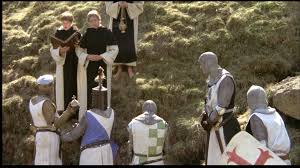Those (many of my
friends) who view the Decalogue as the “eternal
moral law of God” generally
follow a medieval prescription, first developed by Thomas Aquinas (feel free to
correct me if I’m wrong about this) that there are three types Mosaic laws. There
are ceremonial laws, civil laws, and moral laws (the Ten Commandments).
This is in spite of the fact that nowhere in scripture are
the types of laws so enumerated.
To me, there are only two self-consistent approaches. Either all
the Mosaic laws are still binding, or, as I believe, none of them are. This
latter does not (why do I feel like I always have to state the obvious here?)
mean that, for example, murder is suddenly acceptable. It means that while it
was illegal under paragraph OT.MOS.5.4c of the old penal code, it is now
illegal under NT.JES.3.2a of the new-and-better penal code.
I have already mentioned that the view that the Decalogue is
the eternal, immutable moral law of God is problematic. For one thing, as Ec.
34:28 states explicitly, the Ten Commandments are not described as eternal but rather as the
words of the [Mosaic] covenant.
Another (big) problem with this view is the fourth commandment,
the one regarding the Sabbath. For many otherwise conservative evangelical
churches will relax their view of this commandment, sometimes arguing that a
liberal approach is justified because the commandment is not explicitly
repeated in the New Testament. This is a precarious position. You are either
pregnant or you are not. The Decalogue is either the eternal, immutable moral law of God or it ain’t. The view that
nine out of ten are eternal but one of ‘em—eh, not so much—is not a position of
strength.
Here, bigly in my opinion, is another problem for the totality of this view. It is found in
everyone’s favorite book, Leviticus. In chapter 19 we read:
And the Lord spoke to Moses, saying, 2 “Speak to all the congregation of the people of Israel and say to them, You shall be holy, for I the Lord your God am holy. 3 Every one of you shall revere his mother and his father, and you shall keep my Sabbaths: I am the Lord your God. 4 Do not turn to idols or make for yourselves any gods of cast metal: I am the Lord your God.5 “When you offer a sacrifice of peace offerings to the Lord, you shall offer it so that you may be accepted. 6 It shall be eaten the same day you offer it or on the day after, and anything left over until the third day shall be burned up with fire. 7 If it is eaten at all on the third day, it is tainted; it will not be accepted, 8 and everyone who eats it shall bear his iniquity, because he has profaned what is holy to the Lord, and that person shall be cut off from his people. (Lev. 19:1-8)
Here the problem is a natural segue from “moral” law (several
of the Ten Commandments, reiterated) through v4 into “ceremonial law” regarding acceptable
sacrifices in v5-8. There is absolutely nothing indicating that a transition of
law “types” has occurred.
The text then once again segues (seamlessly) back to “moral” law, culminating, according to Jesus, in the
ultimate moral law regarding how we are to treat one another in v18b:
but you shall love your neighbor as yourself: I am the Lord. (Lev. 19:18b)
Immediately following this ultimate moral law (which if it is there at
all, is certainly not explicit in the Decalogue) we get the following ceremonial instructions
19 “You shall keep my statutes. You shall not let your cattle breed with a different kind. You shall not sow your field with two kinds of seed, nor shall you wear a garment of cloth made of two kinds of material. (Lev. 19:19)
A strange approach, ping-ponging back and forth, from laws
that are destined to be null and void to laws that are immutable and eternal, and back again (and again) with no text
indicating that such transitions are occurring.
It is so much more natural to read this, in its entirety, as
laws given to the Jews under the auspices of the Mosaic covenant.

No comments:
Post a Comment